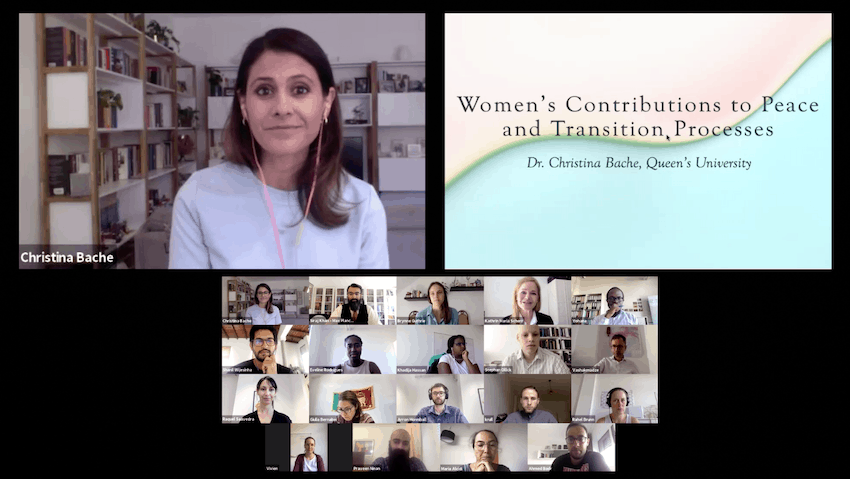The online lecture for the Foundation in Heidelberg focussed on women’s inclusion in peace and transition processes
On 25 August 2021, Dr Christina Bache, Research Affiliate at Queen’s University in Belfast and an adjunct faculty member at Vesalius College in Brussels, delivered the third ‘Perspectives’ lecture of the Max Planck Foundation entitled “Women’s Contributions to Peace and Transition Processes”. The lecture was inaugurated by Dr Kathrin Maria Scherr, one of the Foundation’s Managing Directors, and the discussion was moderated by Siraj Khan (Head of Projects).
A leading expert in peace and conflict management studies, including human security perspectives, positive business engagement, and women’s meaningful inclusion in fragile and conflict-affected situations, Dr Bache presented her research and analysis to research fellows and experts at the Foundation. She provided a thorough overview of the peace and security paradigms relevant for the inclusion of women in peace and transition processes, trends in peace processes in the context of peace agreements during 2020, and an assessment of the extent to which women were included in such peace processes post-conflict. Based on her research, including case studies on Syria and Rwanda, Dr Bache highlighted that the institutional and structural design of peace processes often paid little attention to the associated support mechanisms that would sometimes be the decisive factor that either resulted in the inclusion or exclusion of women in such processes. Factors such as the time, venue, whether a relative could accompany women to hard-to-reach or remote areas, or venues far from their homes, and provisions for childcare, were all factors that impeded or had the potential to impede, the inclusion of women in peace and transition processes, even where there was otherwise an express intention of inclusion.
Dr Bache also presented empirical data to suggest that the inclusion of women in peace agreements results in strengthening the sustainability of such agreements, narrows the gender gap leading to more prosperity and stability and reduces gender inequality and rates of violence against women. In doing so, she emphasised the need for more comprehensive peace processes that formally include women’s representation, that such formal processes must also be linked to informal post-conflict peace processes that are often underestimated, and suggesting that formal negotiations should be enhanced by ensuring broader, more inclusive peace processes.
Dr Bache has previously been a Visiting Fellow at the London School of Economics and Political Science, IDEAS, and a Visiting Fellow with the Wilfred Martens Centre for European Studies. Her regional experience includes Turkey, the Middle East, North Africa, Central America, Europe, and the United States of America.
Following the lecture, Dr Bache answered questions and engaged in discussions with Foundation research fellows and staff on theoretical and practice-oriented questions related to her expertise and experience and to the work of the Foundation.

